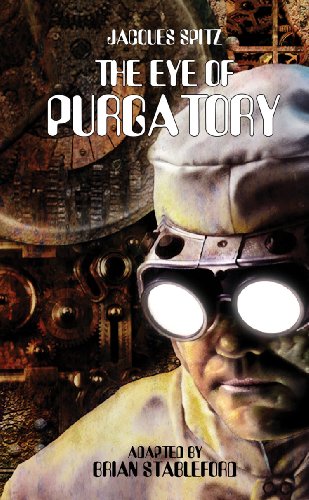 By JACQUES SPITZ (Black Coat Press; 1939/45/2010)
By JACQUES SPITZ (Black Coat Press; 1939/45/2010)
Quite simply one of the great unsung discoveries of recent years, a mini-epic that explores death and decay in a manner that no other novel ever has. I’m referring to one portion of this two-book compilation, specifically the titular L’OEIL DU PURGATORIE, or THE EYE OF PURGATORY, written by the French sci fi maestro Jacques Spitz (1896-1963) and initially published in 1945. The English translation, I should add, was by the prolific Brian Stableford, whose work here is superlative.
The other novel contained in this volume is Spitz’s 1939 effort L’EXPERIENCE DU DOCTEUR MOPS, or THE EXPERIMENT OF DR. MOPS, which was also translated by Stableford. It’s a somewhat interesting time travel-themed story about a neurologist who by rewiring the brain of his assistant Dirk allows him to see into the future. This results in some fortuitous developments–Dirk’s master makes a lot of money off the stock markets due to his “talents”—but also some negatives ones, as when Dirk forecasts the death of a pivotal character. All well and good, but I was a little disappointed that the novel is related from the point of view of a third character, a schlub who’s in love with the neurologist’s stepdaughter, and couldn’t help but wonder how the events of the story might have played from Dirk’s point of view.
That quarry is answered, and in a major way, in THE EYE OF PURGATORY. Once again the subject is a man with the ability to see into the future, but in this case that man’s first person observations are placed front and center. The narrator is a suicidal painter who’s given some kind of drug that causes him to see things as they’ll look months in advance. This initially means he sees people who look a little more wrinkly than they actually are—himself included—and objects that appear moldering and/or yellowed.
But the man’s gaze stretches steadily farther into the future, and soon he’s seeing his surroundings as they’ll appear years, and even decades hence. Thus, before long the man’s fellow humans appear to him as walking corpses surrounded by blackened and crumbling buildings, with the poor guy finding himself “living exclusively in a universe of death.” As the painter’s vision advances ever forward he finds himself surrounded by walking, talking skeletons that eventually give way to indistinct blurs of light amid a featureless wasteland as his gaze stretches far beyond his own death to see thousands of years into the future.
Such bleak visions seem like an extension of the despairing worldview established in the early chapters. The all-encompassing air of death and decay, enhanced by the author’s surrealistic imagination and not-inconsiderable descriptive power, grows positively overpowering, and leads to passages of cosmic desolation (“Before my eyes, like a devouring canker, a nothingness expands that I sense to be infinite”) that favorably recall the type of visionary horror practiced by H.P. Lovecraft and others.
It’s that sense of poetic despair that sets THE EYE OF PURGATORY far beyond most time travel accounts. For that matter, passages like the one in which the protagonist obsessively watches his future self slowly wither and die in a mirror are like nothing else I’ve encountered in any book, science fiction themed or otherwise.
